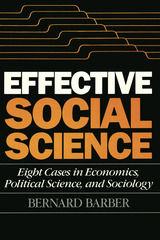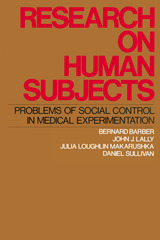2 books about Barber, Bernard

Effective Social Science
Eight Cases in Economics, Political Science, and Sociology
Bernard Barber
Russell Sage Foundation, 1987
Does social science influence social policy? This is a topic of perennial concern among students of politics, the economy, and other social institutions. In Effective Social Science, eight prominent social researchers offer first-hand descriptions of the impact of their work on government and corporate policy. In their own words, these noted political scientists, economists, and sociologists—among them such influential scholars as James Coleman, Joseph Pechman, and Eliz Ginzberg—tell us what it was like to become involved in the making of social policy. These rich personal narratives, derived from detailed interviews conducted by Bernard Barber (himself a veteran of the biomedical poliy arena), illuminate the role of social science in diverse areas, including school desegregation, comprehensive income taxation, military manpower utilization, transportation deregulation, and the protection of privacy. The patterns traced in this volume indicate that social science can influence policy, but only as part of a pluralistic, political process; effective social research requires advocacy as well as a conducive social and idealogical climate. For anyone curious about the relationship between social knowledge and social action, this book provides striking illustration and fruitful analysis.
[more]

Research on Human Subjects
Problems of Social Control in Medical Experimentation
Bernard Barber
Russell Sage Foundation, 1973
How are human subjects treated in biomedical research? What are the expressed standards and self-reported behavior of biomedical researchers in regard to what has sometimes been called their "animal of necessity"? What are some of the determinants of the "strict" and "permissive" patterns which describe the standards and behavior of biomedical researchers? These are the important questions asked and answered in Research on Human Subjects. It is a book based on four years of intensive research. Two studies were completed, one on a nationally representative sample of biomedical research institutions, a second on a sample of 350 researchers who actually use human subjects. In their chapters on "the dilemma of science and therapy," the authors look at the tension between the values of humane therapy and discovery in science. They show that the significant minority of researchers who are "permissive" on the issues of informed consent and a favorable risk-benefit ratio are more likely to be those who are "relative failures" in pursuing the science value. Research on Human Subjects also documents the inadequate training that biomedical researchers get in the ethics of research on human subjects not only in medical schools but in their postgraduate training as well. The medical schools pay relatively more attention to the scientific training of their students than they do to the ethical training that should be its essential complement. The local peer review groups that screen research on human subjects in the institutions where it is carried on are another central focus of attention of the research and analysis reported in this book. The peer review groups do a fairly good job but, the authors show, there are various conditions of their relative efficacy which are not met by review groups in many important research institutions. The medical school review groups, for example, have not been outstanding performers with respect to the several conditions of relative efficacy. In the concluding chapter, the authors discuss the general problem of the social responsibilities of powerful professions and make very specific suggestions for policy change and reform for the biomedical research profession and its use of human subjects.
[more]
READERS
Browse our collection.
PUBLISHERS
See BiblioVault's publisher services.
STUDENT SERVICES
Files for college accessibility offices.
UChicago Accessibility Resources
home | accessibility | search | about | contact us
BiblioVault ® 2001 - 2024
The University of Chicago Press









